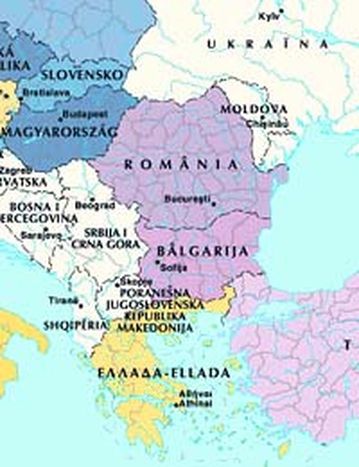
The EU enlargement process: Bulgaria and Romania
Published on
Translation by:
 jakub szynkarek
jakub szynkarek
There have been five enlargements in the history of the EU. The last one took place on 1 May 2004, with the entry of ten new member states. There is more to come.
When they enter, Bulgaria and Romania will become part of a common territory of freedom, democracy and respect for fundamental human rights and the rule of law, as it is defined by the treaty on European Union.
The Treaty regulates the enlargement process and stipulates that any European country may enter the EU if it respects the aforementioned values and has met the accession requirements established in Copenhagen in 1993.
Stable democratic institutions, the rule of law and order and respect for human rights are some of the requirements that must be met. Candidate countries should also have a free market based economy and must agree to perform the duties connected with membership as well as accept the aims of political, economic and monetary union. What is more, accession to the EU will not be possible if the acquis communautaire (the total body of EU law accumulated so far) is not accepted and implemented by suitable administrative and judicial institutions.
The European Economic Community was established by the Treaty of Rome in 1957. The first enlargement took place in 1973, when Great Britain, Denmark and Ireland joined. One of the candidate countries - Norway – decided not to join after having held a national referendum. The second wave was in 1980, when another three countries joined the community: Greece, Spain and Portugal. In 1985 Greenland, which was granted home rule by Denmark in 1979, left the European Community following a referendum. The GDR (former East Germany) finally became a part of European Community in 1990 after the wall came down. Following the official establishment of the European Union in 1992, a third wave of enlargement brought in Austria, Sweden and Finland in 1995. The last and biggest wave of enlargement came in 2004, when Malta, Cyrpus and eight central and eastern European countries joined the EU.
Bulgaria and Romania lead the way to the EU
Bulgaria and Romania have almost passed through the period of changes and adjustments which has enabled them to stand on “the doorstep” of the EU. Negotiations with Bulgaria were finished on the 15 of April 2004 in Luxembourg and with Romania on the 17 December 2004 in Copenhagen. At that time EU Commission hoped that these two countries will access the EU on January 2007.
On the 13 of April 2005, the EU Parliament voted through a proposal supporting the accession of Bulgaria and Romania. The accession treaty was signed on the 25 of April this year in Luxembourg.
Following the signing of this treaty, a ratification procedure was begun. During this period the treaty must be accepted in all the EU member states until the day of accession. It has been already ratified in Slovakia, Hungary, Slovenia, Cyprus, Greece, Estonia, Romania, Czech Republic and Bulgaria. According to the treaty, during this interim period Bulgaria and Romania were given observer status in the EU institutions until their entry to the EU.
Bulgaria and Romania are predicted, according to the treaty, to access the EU on the 1 January 2007. In case the candidate countries are not sufficiently prepared for the accession, a safety clause is included in the treaty which enables EU members, in accordance with the EU Commission proposal, to postpone the date of accession until January 2008.
Perspectives for next EU enlargements
Other Balkan countries and Turkey also want to join the EU. Therefore, accession negotiations with Croatia and Turkey are currently being held. Macedonia also aspires to be the EU member and since December 2004 has had observer status, although no negotiations have been held yet. There are also the countries of the western Balkans; Albania and Bosnia-Herzegovina who are within an association and stabilization process which covers their eventual accession to the EU.
The queue to join the EU remains a long one.
Translated from Proces rozszerzania UE: Bu³garia i Rumunia


